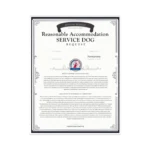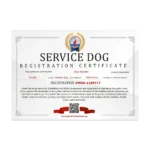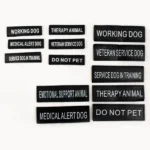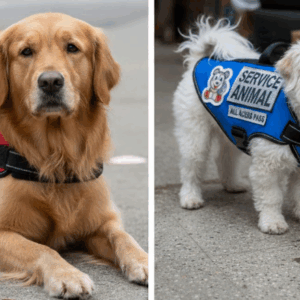As a pet owner, you may have wondered about registering your furry friend as a service animal. Service dogs play a crucial role in the lives of people with disabilities, assisting with everyday tasks and providing support in difficult situations. If you believe your dog has the temperament and preparation to become a service dog, then registering them can be a great way to help others and make a difference in their lives. This article will help you register a service dog.
Step 1: Assess Your And Your Dog’s Suitability


Not all dogs are suitable to become service dogs. Service dogs must have the right temperament, health, and training to perform their duties beneficially. Here are some important factors to consider when assessing your dog’s suitability:
- Temperament – Service animals must have a calm and well-behaved temperament. They should be friendly, obedient, and responsive to commands, even in stressful or unfamiliar situations. Your dog should also be peaceful around people and other animals.
- Health – Service animals must be healthy and free from contagious diseases. They should also be up to date on all their vaccinations.
- Training – The service animals must undergo extensive taming to perform certain assignments and behave appropriately in public places. Your dog should be able to follow basic commands such as “sit,” “stay,” “come,” and “heel.” They should also be able to perform tasks such as retrieving objects, opening doors, or providing support during an anxiety attack.
If your dog meets these criteria, it may be suitable to become a service dog.
The difference between a service dog and an emotional support dog
A service dog is taught to perform specific tasks or work that directly relates to a person’s disability, such as guiding someone with visual impairment, alerting someone with hearing impairment to sounds, or retrieving items for someone with limited mobility. Service dogs have access to public places and accommodations under the Americans with Disabilities Act, and their owners have lawful rights to bring them with them in public spaces.
On the other hand, emotional support animals provide moral strengthening and solace to individuals with mental or emotional dysfunctions. Emotional support dogs are not educated to fulfill express tasks or work but rather ensure companionship and emotional support to their owners. Emotional support animals do not have the same warranted protections as service dogs under the ADA but can be allowed in housing under the Fair Housing Act and, in some cases, allowed on airplanes with proper authentication.
Overall, the main difference between a service dog and an emotional support dog is the type of work they are trained to perform and the legal protections they have under the law.
Step 2: Get a Service Animal Doctor’s Letter
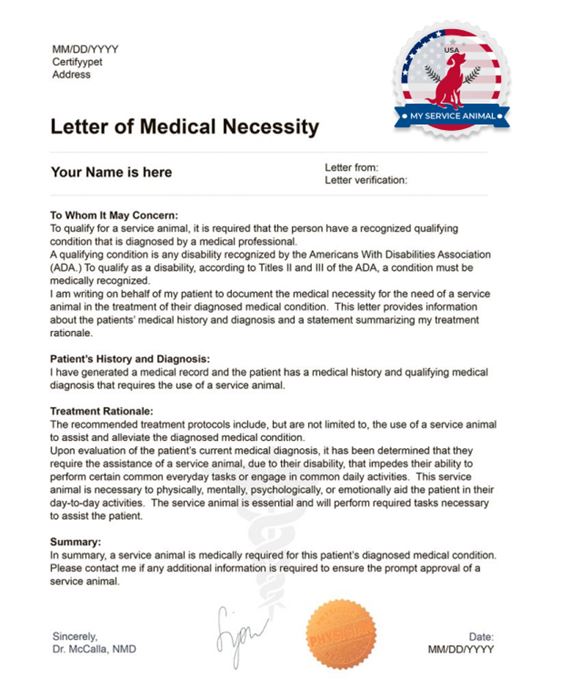

A service dog’s letter is a written deed from a licensed medical professional that verifies the individual’s disability and the need for a service animal. The doctor’s letter is indispensable because it provides legal corroboration of the individual’s disability and their need for service animals.
This letter is usually required by institutions that provide service dogs or by landlords and airlines to allow the individual to have the service animal with them in public spaces or living accommodations. The service dog’s letter should incorporate the specific tasks or work the dog is trained to carry out to help the individual with their ailments.
List of Criteria of Disability to Get a Service Dog Letter
Regarding to Americans with Disabilities:
An individual meets the requirement of “being regarded as having such an impairment” if the individual establishes that he or she has been subjected to an action prohibited under this chapter because of an actual or perceived physical or mental impairment whether or not the impairment limits or is perceived to limit a major life activity.
Accordingly, the law does not provide a clear list of disabilities that fall under it but indicates certain criteria according to which the doctor has the right to decide at his discretion. The criteria for obtaining a service animal letter vary depending on the type of disability, but mainly, the individual must be diagnosed with a physical, psychical, or emotional affliction by a licensed medical professional. In the following sections, we’ll provide a comprehensive list of the criteria for physical disabilities, mental health disabilities, and emotional support disabilities that may qualify for a service dog letter.
Criteria for physical disabilities
- Mobility impairments;
- Balance issues;
- Visual or hearing impairments;
- Epilepsy or other neurological disorders;
- Chronic pain.
Criteria for mental health disabilities
- Post-traumatic stress disorder (PTSD);
- Anxiety disorders;
- Depression;
- Obsessive-compulsive disorder (OCD);
- Schizophrenia.
Criteria for emotional support disabilities
- Autism;
- Intellectual or developmental disabilities;
- Traumatic brain injury (TBI);
- Chronic stress;
- Sleep disorders.
It is possible to get a service dog letter for a disability that is not explicitly listed as chartering for a service animal. In such cases, the individual must show health documentation from a licensed medical professional that verifies the incapacity and how a psychiatric service dog can help mitigate the limitations caused by the disability. The ADA dog must be trained to perform specific tasks or work related to the individual’s disability and be necessary for daily life.
How to ask your therapist for a service animal letter
Asking your therapist or mental health care provider for a service dog letter can be a menacing and stressful experience, but there are a few steps you can take to make the process smoother:
- Research the benefits of having an ADA dog: Before you approach your therapist, it’s crucial to understand the advantages of having a service dog and how it can improve your quality of life. This will allow you to clearly and concisely explain your reasons for wanting a service animal to your therapist clearly and concisely.
- Discuss your disability with your therapist: If you haven’t already, have an open and honest conversation about your disability and how it limits your daily life. This will help your therapist realize the impact of your disability on your life and how a service dog can help mitigate those limitations.
- Ask your therapist for a letter: Once you have discussed your disability with your therapist, you can ask them for an ADA letter. Be specific about the tasks or work you need the service dog to perform to help you with your disability.
- Detail any necessary information: Your therapist may require additional information to write the ADA letter, such as your medical history or the specific tasks the service dog needs. Make sure to provide any necessary information to your therapist promptly.
Remember, it’s essential to approach the conversation with your therapist with honesty and openness. They are there to help you, and getting a service dog letter can be a life-changing experience.
Step 3: Register Your Dog with a Service Dog Organization


Once you have assessed your dog’s suitability, the next step is to register them with a service dog organization. These organizations provide training, certification, and registration for psychiatric service dogs and guidance on behaving in public places. Here are some of the steps you will need to follow:
- Research Service Dogs Organizations – Many organizations provide animal training and registration. It is essential to research and find a reputable organization that meets your needs.
- Attend Training Sessions – Once you have found a suitable organization, you must attend training sessions with your dog. These sessions will help your dog learn the necessary skills and tasks to become a service dog.
- Get a Training Certificate – After completing the training sessions, your dog will need to undergo an evaluation to assess their suitability as a service animal. If they pass the evaluation, they will be certified as service animals.
- Database Registration: Once certified, you can optionally put them on record with the national service animal registry like MyServiceAnimal. This registration will provide you with an identification card and, optionally, service dog vests for your dog, which will allow them to accompany you in public places.
Registration benefits
Online enrollment as a service dog owner can provide several benefits, including:
- Additional documentation: Registering your pet online can provide additional documentation that verifies your dog’s training and status as a service dog. This can be useful when you need to prove that your dog is an ADA service dog, such as when accessing public places or accommodations.
- Easy access to resources: Many online registration organizations provide resources and support for ADA dog owners, such as information on training and handling, legal rights and protections, and access to products and facilities explicitly designed for service or therapy dogs.
- Increased awareness: Registering your service dog online can help increase awareness of ADA dogs and their important work. This can help to reduce the stigma and misunderstanding surrounding service dogs and improve public acceptance of them.
- Convenience: Online registration is a convenient and efficient way to register your ADA pet. You can do it from home, and many organizations offer quick and easy authorizing processes.
- Peace of mind: Service dog registration can provide peace of mind that you have taken all necessary steps to ensure your dog is properly trained and documented as a service dog. This can help to reduce stress and anxiety related to access issues or legal questions.
The information required to register your service dog online


It may vary depending on the registration organization, but typically, the following information is required:
- Your personal information: This includes your full name, mailing address, email address, and phone number.
- Data about your service dog: This includes the dog’s name, breed, age, and gender. Optionally, you can add your pet photo, which will be visible on the service animal registration ID card.
- Documentation of your disability: You will likely need to provide an ADA letter or other medical documentation from a licensed medical professional that verifies your disability and the need for a service dog.
- Proof of training: Some registration organizations may require proof that your service or therapy dog has completed training from an accredited training program or has been trained by a licensed professional.
- Payment: A fee may be associated with registering your service animal online, so be prepared to provide payment information.
It’s important to note that while registering your service dog online is not legally required, it may be beneficial in providing additional documentation of your service dog’s training and tasks. Before registering your service dog online, be sure to research the organization and ensure they are reputable and provide legitimate documentation that can help you gain access to public places or accommodations
FAQs:
- Is it necessary to register a dog as a service dog?
No, registering a service dog is not legally required, but it can provide various benefits, including easier access to public places, housing, and transportation.
- Can any dog become a service dog?
No, not all dogs are suitable to become service dogs. They must have the right temperament, health, and training to perform their duties effectively.
- How much does it cost for service dog registration?
The cost of registering a service dog varies depending on the organization and the training required. It can range from $40 to several hundred dollars.
- Can I train my own dog in a service dog training program?
Yes, you can train your dog to be a service dog, but it requires significant time, effort, and expertise. It is recommended to seek guidance from a professional service animal organization or trainer to ensure that your dog receives the appropriate training and certification.
- What tasks can a service dog perform?
Service dogs can perform a wide range of tasks, depending on the needs of their handler. Some common tasks include providing mobility support, alerting to sounds or alarms, retrieving objects, opening doors, providing balance support, and offering emotional support during anxiety or panic attacks.
Conclusion
Service dog registration is a great way to support and assist people with disabilities. It requires careful assessment of the dog’s suitability and extensive training and certification through a reputable service dog organization. Following the two simple steps outlined in this article can help your furry friend become a valuable asset to someone in need. Remember that service dogs are not just pets; they are working animals with an important job to do, so it’s essential to provide them with the care, training, and respect they deserve.
